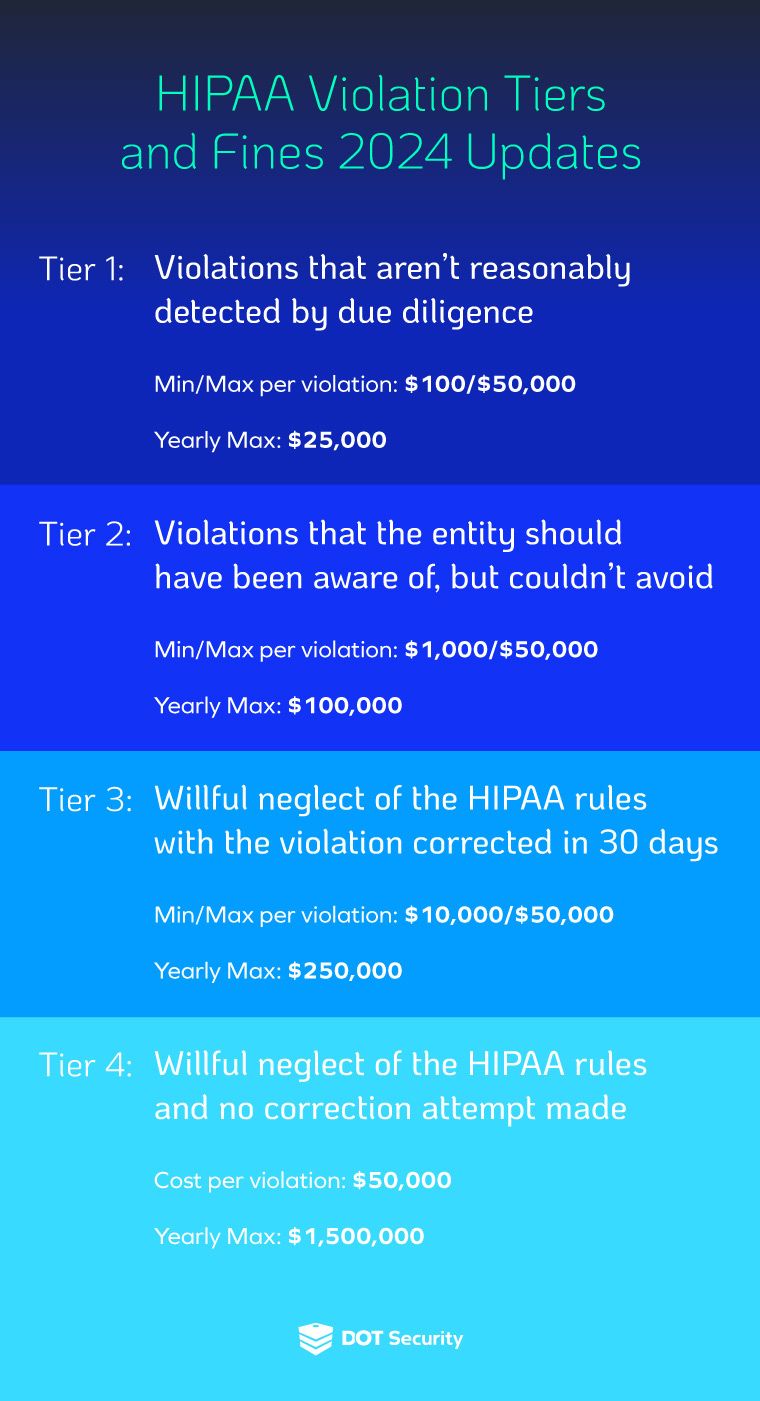Compliance Services
What are the Consequences of a HIPAA Violation?
February 13, 2024
10 minute read

The Health Insurance Portability and Accountability Act (HIPAA) was put in place to regulate the ways in which patient data is used and shared with an emphasis on information sharing disclosure and patient consent. Ultimately, HIPPA regulations are there to protect patients.
The consequences of a HIPAA violation can be extremely harmful to businesses, especially for repeat offenders or those neglecting regulations entirely.
Sign up for our newsletter!
To avoid HIPAA violations, it’s imperative that covered entities prioritize cybersecurity as a whole. For example, failure to conduct a risk audit or install a reasonable plan for cyberattacks would both constitute a HIPAA violation leading to significant fines at a bare minimum.
If you want to see how HIPAA violations can affect an organization found operating outside of compliance, take a look at these six significant breaches and the penalties assigned in 2023. HIPAA violation consequences often go beyond the financial damage as well, since customer trust is also lost which can hurt business reputation and result in additional future losses.
The following sections walk through HIPAA violation categories, the associated consequences, and what businesses can do to avoid these violations in the first place.
Test your HIPAA compliance readiness by downloading and reviewing DOT Security’s Checklist: What are the HIPAA Safeguards for Compliance?
Intentional vs. Unintentional HIPAA Violations
HIPAA is full of strict rules and regulations regarding the protection and use of individual healthcare information. The rules apply to covered entities such as doctors, nurses, healthcare providers, and insurance companies that handle sensitive protected health information (PHI).
HIPAA violations are organized into two main categories: intentional and accidental. Simply put, did the organization know that a patient’s PHI had been exposed? HIPAA violation consequences differ based on whether the violation was intentional or accidental.
Here are a few things to keep in mind when thinking about intentional and accidental HIPAA violations:
- Both intentional and unintentional violations result in fines, but intentional misuse of individually identifiable health information is a serious offense that is investigated by the Department of Justice (DOJ) and can result in both fines and legal action.
- An accidental violation can occur due to a lack of data encryption or cybersecurity standards, resulting in a data breach and loss of patient health data. Cyberattacks resulting in lost or stolen data can come from multiple attack vectors from full-blown cyberattacks to simpler phishing tactics. They can also be caused by employee error, such as lost credentials or the misplacement of files.
- Intentional violations can be performed by anyone but typically involve stolen data that is intended to be sold by the covered entity or maliciously used for personal or commercial gain. An example would be stealing patient data to sell to a rival company or use as extortion.
Whether the HIPAA violation was intentional or not, there will be consequences.
HIPAA Violation Consequences
Many large hospitals and healthcare systems lack the sophisticated network defense systems they need to properly secure patient data, refute cyberattacks, and avoid HIPAA violations.
“As of mid-December, the Department of Health and Human Services (HHS) Office for Civil Rights (OCR) had received 541 notices of data breaches affecting more than 500 individuals during 2023. Among these were incidents that compromised the information of millions, or even tens of millions, of individuals”
Dave Muoio, Fierce Healthcare -
Because protected health information is so important, HIPAA violations are met with serious consequences, especially if covered entities are found to be willfully negligent of the regulations.
Therefore, it is crucial for covered entities to develop a thorough and layered cybersecurity strategy capable of protecting patient data while maintaining everyday operations and workflows.
HIPAA Violation Tiers and Fines
HIPAA violations are categorized into four distinct tiers that identify the severity of the violation and measure the negligence performed by the covered entity (any organization that must follow HIPAA regulations) when handling protected information and data.

These HIPAA violation fines are dictated by the HITECH Act a health act created to improve overall health, service, and patient engagement in the US. These fines are adjusted annually to account for inflation.

While each tier has a designated fine minimum and maximum, the actual fine is determined after an investigation by the Department of Health and Human Services’ (HHR) Office for Civil Rights (OCR). This authority takes violation history and incident severity into account.
What are the HIPAA Violation Tiers?
The four tiers of HIPAA Violations and their corresponding consequences are as follows:
- Tier 1 Violation: This is a violation that the covered entity was unaware of and could not have realistically avoided, even if a higher amount of care had been given to following the HIPAA regulations. A tier 1 violation results in a minimum fine of $100 per violation up to a maximum of $50,000 per violation
- Tier 2 Violation: This occurs when a HIPAA-covered entity should have been aware of a violation but could not have avoided it. This is the last tier before the OCR labels the violation “willful neglect.” For tier 2 violations, the minimum fine is $1,000 per violation up to a max of $50,000 per violation
- Tier 3 Violation: A tier 3 violation is the first violation that is a result of what the OCR deems “willful neglect” of HIPAA regulations. In a tier 3 case, the covered entity has at least made an attempt to correct the problem. For tier 3 violations, the minimum fine is $10,000 per offense with a maximum of up to $50,000 per violation
- Tier 4 Violation: This is the highest tier of HIPAA violation and is defined as a violation due to willful neglect where there is no attempt at correction. There is a minimum fine of $50,000 per violation and no set maximum
Criminal Violations of HIPAA
If a HIPAA violation is deemed criminal—for example, if HIPAA-protected information is stolen, or if a covered entity knowingly obtains or discloses PHI—the DOJ will investigate. Offenders can face large fines and additional legal action like jail time depending on the severity of the offense.
Offenses committed under false pretenses can face fines up to $100,000 and 5 years in prison.
Offenses committed with the intent to sell, transfer, or use PHI for commercial or personal gain, or to bring about malicious harm can result in fines of up to $250,000 and as much as 10 years in prison.
Wrapping up on the Consequences of a HIPAA Violation
Maintaining HIPAA compliance and meeting all regulations is critical for covered entities in the healthcare industry. This is not only because the consequences of a violation include hefty fines and potential jail time, but also because a serious data breach can result in lost business, erosion of patient trust, and irreparable harm to your organization’s reputation.
By taking the time to install a comprehensive cybersecurity strategy, you can protect patient PHI, maintain normal operations, and most importantly, avoid unnecessary HIPAA violations and the associated consequences.
To learn more about HIPAA and what it takes to ensure your healthcare organization is compliant, download and review DOT Security’s helpful Checklist: What are the HIPAA Safeguards for Compliance?.
